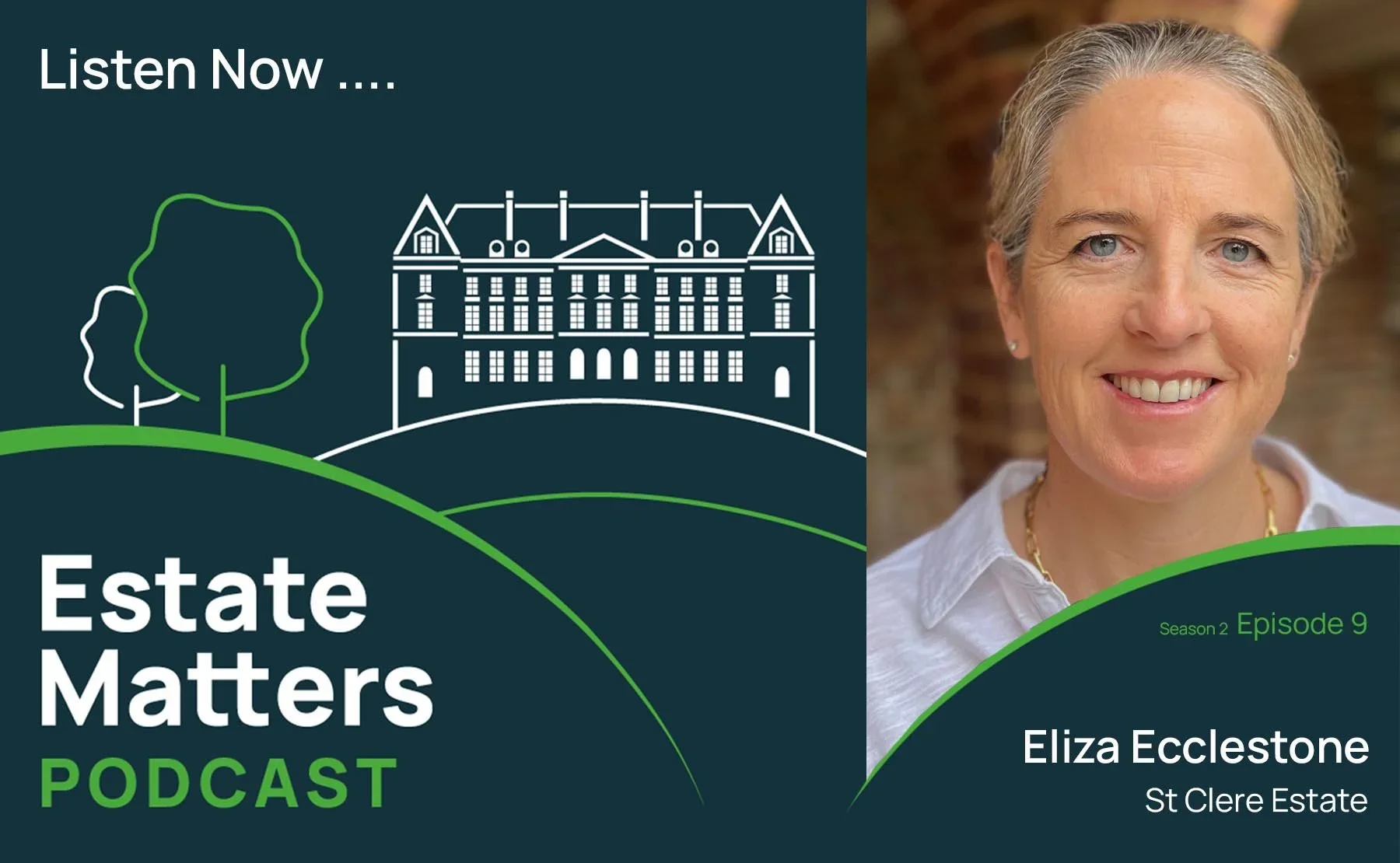Estate Matters S2 Ep9: Eliza Ecclestone | I'm a YIMBY
Estate Matters S2 Ep9: Eliza Ecclestone | I'm a YIMBY
The challenges of running a rural estate with a grade 1 listed house at its centre are described by Eliza Ecclestone in the latest episode of the Estate Matters podcast.
But those challenges do not stop her from working hard to achieve her ambitions to maintain a diversified rural business, enhance the environment and battle often intransigent planners to provide much needed attractive and affordable housing around the Estate.
Eliza is the owner and managing trustee of the St Clere Estate near Sevenoaks in Kent and the Executive Chair of Trustees of the Chevening Estate, the official country residence of the Foreign Secretary.
She was awarded the British Empire Medal for her work during the Covid pandemic to set up a community support system for the most vulnerable, helping with everything from providing children of poorer families with computers for online schoolwork to setting up a Lock Down Larder to deliver food to those who could not get out.
Eliza inherited the Estate unexpectedly and was beginning a career as a solicitor when she had to change course and take over the running of the 3,000 acres at St Clere, including a farm, forestry and residential and commercial property, along with the historic house at the centre.
She tells Estate Matters podcast host Anna Byles that there is an almost unanimous view among her farming and estate-owning colleagues that planning restrictions are the single biggest drag on making improvements to local communities.
“Effectively everything we want to do here starts with a no,” she says. “You have to persuade and try and do what you can without planning - and then when you hit a moment when you have to have planning [permission] it’s a hard slog.”
During her years at the helm, she has seen huge changes in the way land is managed and has made significant improvements to the Estate and its long-term viability.
St Clere is used as a location for major Hollywood movies, hosts a number of festivals and events and provides opportunities for thousands of people to enjoy the countryside.
There were films being made at St Clere when Eliza was growing up and she recalls Hollywood ‘A’ listers Elizabeth Taylor, Rock Hudson, Tony Curtis, Angela Lansbury and Kim Novack all on set, making an Agatha Christie adaptation.
“I was too young to realise they were all film stars, but I definitely started getting an idea of the magic of Hollywood and the glitz and glamour or it,” she says. “So I love doing the filming, although I am now worried that’s going to fall away with AI etc, but that’s been a kind of solid plank of our diversification and it’s probably the fun one for us.”
Eliza is blunt about the cost of maintaining a rural estate like St Clere and particularly the upkeep of the house, revealing it took ten years of profits from running events and festivals to save up the money to replace the roof.
She says the return on capital is no more than 1% - and a large proportion of that is ploughed back into the Estate. But she admits there are days when hard choices have to be made about what can be sold to boost income.
Eliza admits to facing criticism from some sections of the community who often fail to understand the challenges of maintaining a beautiful Grade 1 listed building like St Clere. She says: “The kind people drive up and say it’s beautiful. But a lot of people say ‘they’re rich snobs who live in the big house and have it very easy.’
“Pretty much all of the money we make goes into keeping this place up; pretty much all of the money we make in diversifying the farm funds the farming and looking after the landscape and the hedges and planting trees.”
And she details the challenge of trying to establish a woodland outdoor play centre at St Clere which fell foul of local planners. She said setting up the treehouse adventure activity centre for children could have created 50 jobs and brought in around 100,000 visitors to the area.
Eliza tells Anna: “It gets kids off screens, it has no impacts on the woodlands … And all we really needed was a WC block in the middle - and we can’t get it.”
Despite the challenges, Eliza acknowledges she is lucky to be able to live and work in such a beautiful part of the country. She believes farms and estates should strive to be the centrepieces of communities and the majority are doing their best to reinvest in the land and buildings they own for the benefit of society more widely.
Her priorities now include building homes close to the railway station that is just 40 minutes from central London by train. She has plans for 200 homes to include significant environmental improvements, dementia-friendly properties for the elderly and well-being as a major feature.
She admits she had a “no” from planners at the first time of asking but adds: “I’ll keep trying – I’m a Yimby [Yes in my back yard].”
She says building trust is the most important part of a landowner’s relationship with their community: “We’ve always done things very carefully and there’s nothing you can point to that we’re not proud of.”

